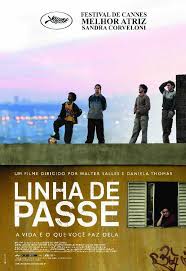
 Directors: Walter Salles, Daniela Thomas
Directors: Walter Salles, Daniela Thomas
Writers: George Moura, Daniela Thomas, Bráulio Mantovani
Actors: Sandra Corveloni, Vinícius de Oliveira, João Baldasserini, José Geraldo Rodrigues, Kaíque de Jesus Santos
Production Co.: Media Rights Capital, Pathé Pictures International, Videofilmes
Country: Brazil
Year: 2008
Language: In Portuguese with optional English, Spanish, or Portuguese subtitles
Format: DVD
[ratings]
Summary: Four poor, fatherless brothers in São Paulo aspire to break free of their social status and its trappings by becoming professional soccer players.
This dramatic film shows the life of a poor single mother, and her four sons who all have different aspirations. It realistically illustrates the struggles of typical poverty stricken Brazilians through the different characters. The quality of cinematography is outstanding, as dreams of becoming successful against the odds are followed in this movie. Although there is a melancholy mood throughout the film, it is a very artistic portrayal of the obstacles in the slums of Brazil.
Linha de Passe is a compelling film concerning the struggles of four family members to reach their goals and fulfill their dreams. Though they are half brothers, the four central characters have goals that are entirely different. What these siblings do share is desperation resulting from having to face the difficulties pertinent to members of the lower working class in Brazil. Unlike many other Brazilian films, Linha de Passe conveys a message of positivity and hope for both the characters in the film and Brazilian society as a whole.
The film presents a prevalent problem in Brasil: the lack of opportunities for “class C” citizens to improve their lives. Salles and Thomas effectively represent this social disparity through the personal struggles of the main characters. The directors show that “common” Brazilians only have a few choices in life–among them, religion, soccer, crime, or the low-wage labor market. This film was one of my two favorite films we watched in our Portuguese class this term (the other being Proibido Proibir); the cinematography and storyline were both incredible.
“Linha de passe” depicts the problems that were so eloquently described in Leandro Machado’s satirized piece, “De repente, classe C.” A family that has only known poverty in Brazil, according to the film, has very few opportunities for upward economic mobility and even fewer outlets for social acceptance. This film was one of my favorites throughout the course because it shows how four siblings can have such different aspirations despite being from such similar backgrounds. If you want to watch a film on soccer, poverty, and triumph, watch this!
This film demonstrates the troubled life of four young, lower class citizen brothers whose dream is to become professional soccer player. The film realistically captures a common, near hopeless dream for many, if not the majority of young lower class Brazilian males. Several social issues surface in this film, such as the lack of upward mobility opportunities in Brazil and the narrow opportunities offered by the popular dream of being a professional soccer player. The story line is dramatic and gradually creates an emotional connection between viewer and film, as these young soccer players enter the competitive world of Brazilian soccer.